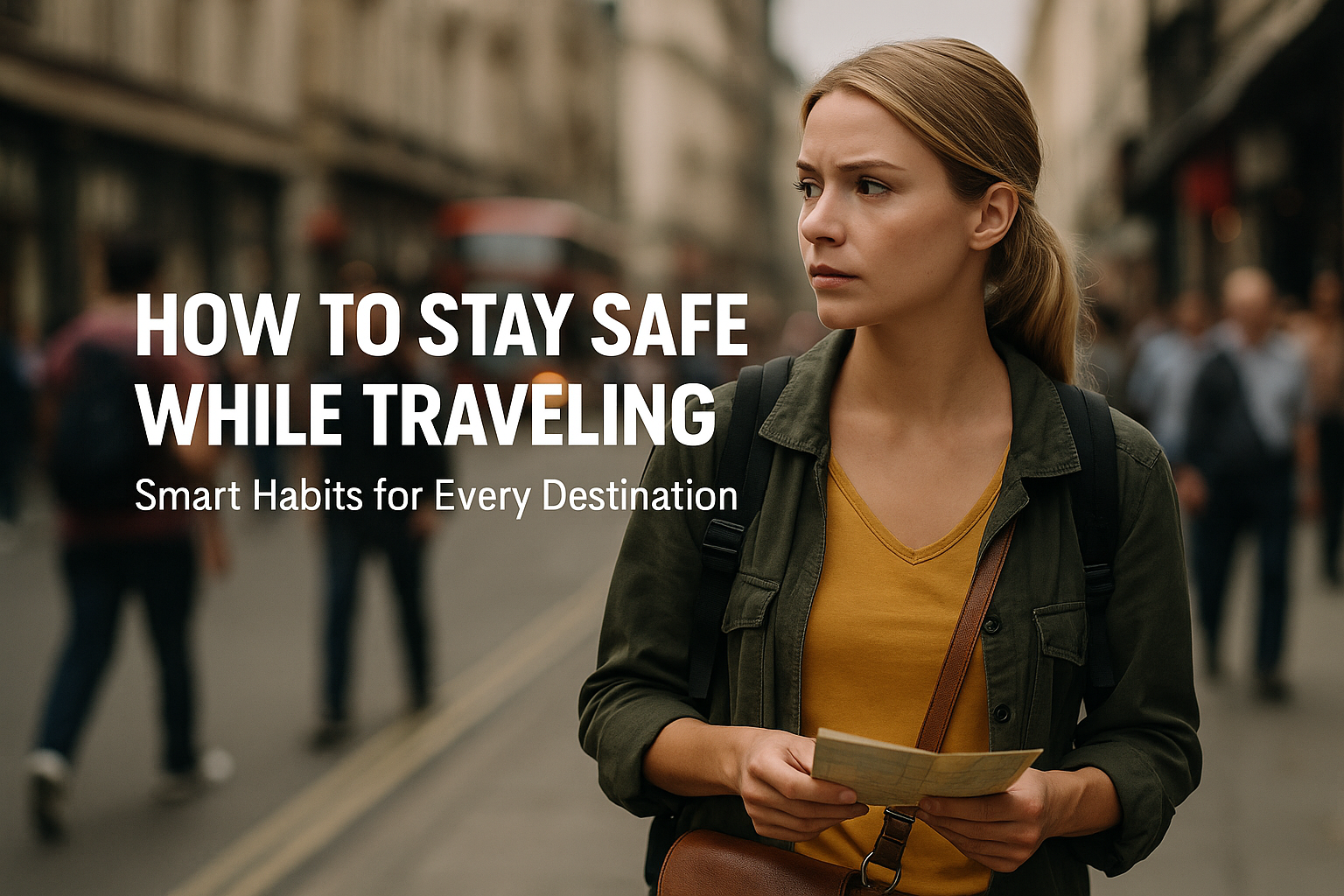Traveling opens your world—but it also brings you into unfamiliar environments where awareness and preparation are key. Whether you’re exploring a bustling city or a quiet countryside, prioritizing safety can help you avoid trouble and enjoy your trip with peace of mind.
This guide will walk you through essential safety tips for travelers—covering everything from scams and health to tech and transportation—so you can explore with confidence.
Research Before You Go
Safety begins with information. The more you know about your destination, the better prepared you’ll be.
Things to research before traveling:
- Local laws and customs (e.g., clothing, alcohol, public behavior)
- Neighborhood safety (know which areas to avoid)
- Common tourist scams in that region
- Emergency contacts (local embassy, police, hospital)
- Entry requirements and health recommendations
Check official sources like government travel advisories, and read recent traveler reviews on forums and apps.
Keep Your Documents Secure
Losing your passport or ID can turn a great trip into a disaster.
Tips to protect your documents:
- Keep your passport in a money belt or hidden pouch
- Carry a copy (physical and digital) of your passport and visa
- Use a hotel safe or lockbox when you don’t need your documents
- Don’t carry all your ID and cards in one place
- Email yourself a scan of important documents for cloud access
In case of loss or theft, these steps will make recovery much easier.
Avoid Looking Like a Target
Thieves often spot easy targets—people who seem distracted, lost, or obviously unfamiliar with their surroundings.
Smart habits:
- Walk with purpose, even if you’re unsure
- Avoid flashy jewelry or branded designer bags
- Keep phones, cameras, and valuables out of sight in busy areas
- Use crossbody bags with zippers and anti-theft features
- Blend in with local dress and behavior where possible
Confidence and awareness go a long way in deterring unwanted attention.
Protect Your Money
Keeping your money safe means more than just not getting robbed—it also means avoiding scams and overspending.
Tips to safeguard your cash:
- Carry only the money you need for the day
- Use travel cards with fraud protection and no foreign transaction fees
- Have a backup credit card in a separate bag
- Use ATMs inside banks, not in isolated areas
- Beware of card skimming—cover the keypad when entering your PIN
Also, familiarize yourself with the local currency to avoid being short-changed.
Be Cautious with Public Wi-Fi
Public Wi-Fi can be convenient—but it’s also risky if you don’t take precautions.
Tech safety tips:
- Use a VPN (Virtual Private Network) for secure browsing
- Avoid accessing sensitive information (banking, email) on open networks
- Turn off auto-connect features on your devices
- Use two-factor authentication for important accounts
- Always log out after using shared computers or networks
Your digital safety is just as important as your physical safety.
Watch for Common Travel Scams
Unfortunately, some places attract people looking to exploit tourists.
Popular scams to watch out for:
- “Free” bracelets or gifts being placed on you, then demanding payment
- Taxis without meters charging inflated rates
- “Closed” attractions—redirected to a commission-based vendor
- Overpriced menus for tourists only
- Fake petitions, pickpocket distractions, or staged emergencies
If something feels off—it probably is. Trust your gut and walk away.
Stay Healthy
Illness can ruin a trip faster than anything. Take basic precautions to stay well.
Health tips for travelers:
- Drink bottled or filtered water in areas with poor tap water
- Carry hand sanitizer and use it often
- Eat at clean, busy establishments
- Pack a small first-aid kit
- Know where the nearest clinic or pharmacy is located
- Keep essential medications in your carry-on
Check vaccine requirements or health risks for your destination in advance.
Use Safe Transportation
Transportation safety varies around the world. Don’t assume what works at home applies everywhere.
Tips by transport type:
- Taxis: Use reputable companies or apps like Uber/Bolt
- Public transport: Watch your belongings and avoid empty cars at night
- Rental cars: Know local driving laws and carry an international license if needed
- Walking: Avoid poorly lit or deserted areas at night
- Biking: Always wear a helmet and follow local traffic rules
When in doubt, ask locals or your hotel for trusted transport options.
Stay in Safe Accommodations
Your lodging should be a safe haven—not a source of stress.
What to look for:
- Positive recent reviews that mention safety
- 24/7 front desk or security
- Lockable windows and secure entryways
- Well-lit common areas and surrounding streets
- Fire exits and emergency contact info posted
If anything feels unsafe, don’t hesitate to request a room change or find alternative lodging.
Trust Your Instincts
Your intuition is one of your best safety tools. If something feels off—it likely is.
Listen to yourself when:
- A person or place gives you bad vibes
- You feel watched or followed
- An offer seems too good to be true
- You feel confused or pressured
It’s okay to be cautious. Your safety is more important than politeness.
Final Thoughts: Travel Smart, Travel Safe
Staying safe while traveling doesn’t mean being paranoid—it means being prepared, aware, and respectful of your surroundings. Most trips are safe and smooth, but having the right habits and mindset can help you avoid trouble and handle unexpected situations with confidence.
So go explore, stay sharp, and enjoy the journey. The world is waiting—and you’re ready for it.
